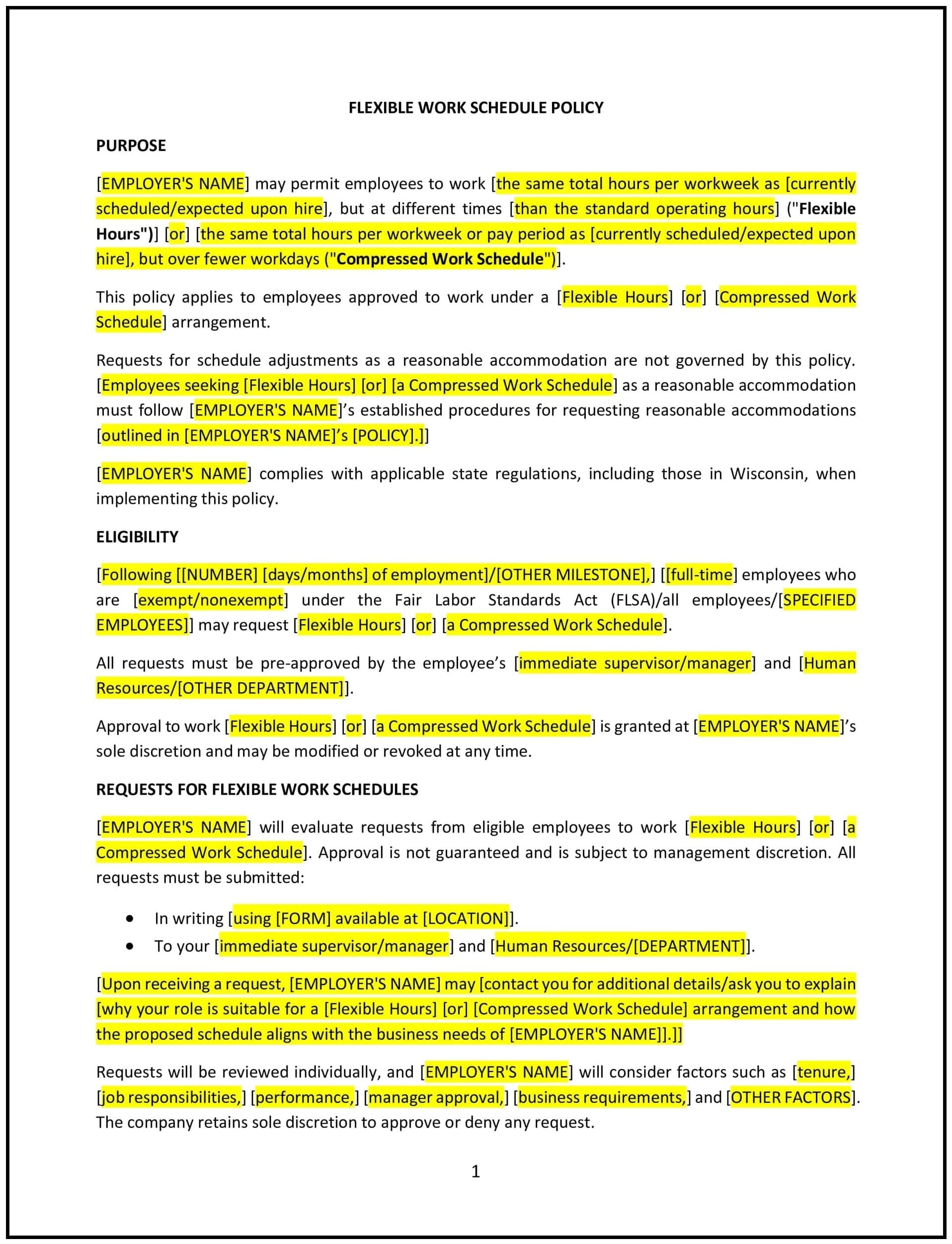Flexible work schedule policy (Wisconsin): Free template
Got contracts to review? While you're here for policies, let Cobrief make contract review effortless—start your free review now.

Customize this template for free
Flexible work schedule policy
A flexible work schedule policy helps Wisconsin businesses provide employees with more control over their work hours, enabling them to balance professional responsibilities with personal needs. This policy outlines the guidelines for employees requesting flexible work hours, the conditions under which flexibility is offered, and the processes for approving or denying requests. It also ensures that both business operations and employee needs are effectively balanced.
By implementing this policy, businesses can improve employee satisfaction, attract and retain talent, and enhance productivity while maintaining operational efficiency.
How to use this flexible work schedule policy (Wisconsin)
- Define eligible roles: Specify which roles or departments are eligible for flexible work schedules, such as remote work, staggered hours, or compressed workweeks. Certain positions that require constant on-site presence may be excluded from flexible scheduling.
- Outline available flexible options: Provide clear descriptions of the types of flexible work options available, including flexible hours, remote work, job-sharing, compressed workweeks, and other arrangements that could meet both the business’s and the employee’s needs.
- Set eligibility criteria: Specify who is eligible for flexible work arrangements, such as full-time employees, employees with a certain length of service, or those in specific roles. Clarify whether flexible work is a right or a privilege based on business needs and the role of the employee.
- Establish request and approval process: Define how employees can request flexible work arrangements, including the necessary forms or communication procedures. Outline the approval process, who is responsible for evaluating requests, and the criteria for granting or denying requests.
- Address operational requirements: Ensure that flexible work arrangements do not disrupt business operations. Set expectations for availability, communication, and productivity while employees are working flexible hours or remotely.
- Address performance expectations: Make clear that employees with flexible schedules are still required to meet performance standards, complete assigned tasks, and adhere to deadlines, regardless of their work hours or location.
- Protect confidentiality and security: Ensure that employees working remotely or on flexible schedules maintain company data security and confidentiality. Outline any specific security measures or protocols they must follow, especially when accessing company systems from outside the office.
- Review and adjust regularly: Regularly assess the effectiveness of flexible work arrangements and adjust the policy as needed to ensure that it supports both employee well-being and the company’s goals.
Benefits of using this flexible work schedule policy (Wisconsin)
This policy offers several benefits for Wisconsin businesses:
- Enhances employee work-life balance: Flexible work schedules allow employees to better manage their personal and professional lives, leading to higher job satisfaction, less stress, and improved well-being.
- Increases employee retention: Offering flexibility can increase employee retention, particularly for employees seeking a better work-life balance, such as caregivers or those with long commutes.
- Attracts top talent: A flexible work schedule can make the company more attractive to potential hires, particularly those seeking flexibility in their work arrangements.
- Improves productivity: Research shows that employees with flexible work schedules often experience higher productivity, as they can work during hours when they are most focused or better manage personal responsibilities without taking time off.
- Reduces absenteeism: Flexible schedules allow employees to handle personal matters without needing to take full days off, reducing absenteeism and allowing for more consistent attendance.
- Supports business continuity: By offering flexibility, businesses can ensure that work is completed even if employees face challenges, such as inclement weather or personal issues, which could otherwise disrupt operations.
Tips for using this flexible work schedule policy (Wisconsin)
- Communicate the policy clearly: Ensure that employees understand the types of flexible work arrangements available, the process for requesting flexibility, and the expectations for maintaining productivity and availability.
- Set clear boundaries: Establish expectations for work hours, availability, and communication, especially if employees are working remotely or on a non-traditional schedule. Ensure there is alignment on when employees are expected to be reachable for meetings or collaboration.
- Evaluate employee performance: Ensure that flexible work arrangements are not used as a reason to lower performance standards. Regularly assess employee performance and provide feedback on how well they are meeting expectations.
- Be consistent: Apply the policy fairly and consistently across all employees who are eligible for flexible work. Make decisions based on the business needs of the organization and the role of the employee.
- Encourage regular check-ins: For employees working remotely or on flexible hours, encourage regular check-ins with supervisors to ensure they are staying on track and that any challenges are addressed promptly.
- Regularly review the policy: Periodically review the flexible work policy to ensure it remains effective and aligned with the needs of both the company and employees. Adjust the policy as necessary to accommodate changes in business operations or employee preferences.